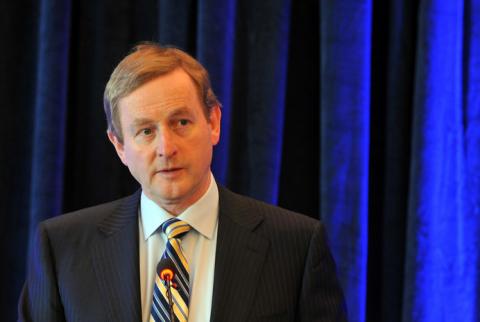The unlikely Taoiseach

Enda Kenny has reflected the prevailing political consensus throughout his career. By Vincent Browne.
On the day that yet another piece of bungling by this government was identified by the Supreme Court ("acted wrongfully. . . in a manner that was not fair, equal or impartial"), Enda Kenny was being feted in Berlin as the "European of the Year" - essentially because of the docility of the Irish people surrendering to the troika's austerity diktats.
In the same week, Kenny was conferred with some biographical gravitas, via the publication of the first book on himself, Enda Kenny: The Unlikely Taoiseach, by the highly regarded political commentator, John Downing.
The book chronicles Kenny's remarkably unremarkable political career, in particular how he was virtually anonymous for most of the years he served in the Dáil until he became leader of Fine Gael in 2002.
It quotes at length only one of his infrequent speeches (in 1983, eight years after he was first elected): "One of the reasons for a rural deputy speaking at all in the House is that he has the opportunity of sending details of his contributions to local papers, thereby keeping his name before the people he represents."
He went on to say that, for the most part, a deputy comes to the Dáil on Tuesdays, with his or her briefcase full of representations from constituents, and spends three days in Dublin writing to ministers or county managers and then forwarding their replies to constituents. He did not seem to reflect that this was hardly the point of being elected to the Dáil.
Likewise, his two and a half years as Minister for Tourism in John Bruton's government from late 1994 to mid-1997 seem to have been humdrum too. Even after his ministerial sojourn, he got no substantial brief on the Fine Gael front bench (or no brief at all).
Implausibly, he decided to contest the Fine Gael leadership after John Bruton was heaved in 2001 - and even his formidable and supportive wife, Fionnuala O'Kelly, was taken by surprise.
When Michael Noonan won that leadership contest, there was no place for Kenny on the front bench, Noonan preferring Kenny's able constituency colleague, Jim Higgins.
But in 2002, after Noonan had almost done to Fine Gael what Michael McDowell later did to the PDs, Kenny became leader, in preference to Richard Bruton, Phil Hogan and Gay Mitchell.
His main initial success as leader of Fine Gael was in reconciling different factions within the ranks. Fine Gael became a happy party for several years, a condition it had seldom enjoyed - maybe ever. This was because Kenny was - and is - a genuinely nice guy, uncluttered with political ideas or even the political hang-ups that unsettled the party under other leaderships. Then he revived the party in 2007 and put it in pole position to benefit from the Fianna Fáil meltdown in 2011.
There are two disappointing aspects to this otherwise valuable biography. The first is that the book ends 17 months ago, right at the start of Kenny's period as Taoiseach, so by far the most substantive period of his career is not covered. The second is that the book is almost entirely non-political, which may seem strange for a political biography, but many others are in the same vein. Indeed, most political journalism is in that vein.
It will be protested that it is non-political because Kenny has apparently been non-political. Apparently, but inaccurately.
Kenny of course is, and has been, political and, however unwittingly, has reflected the prevailing political consensus throughout his career. For instance, throughout the Celtic tiger period, during which he was the alternative Taoiseach for five years, not once did he criticise the policies of tax cuts, property bubble incentives, deregulation and ethos that drove us into the crisis.
His sole complaint was that Fianna Fáil in office did not do even more of the same. That would seem to me to be a fairly weighty part of any evaluation of Enda The Unlikely Taoiseach.
Also, Kenny embodied the "core Fine Gael values", without ever articulating them: law and order, unwavering (or only vaguely wavering) support for the status quo, especially on property, wealth distribution and charity. So no surprise, then, that his government, while protesting that it seeks to protect the vulnerable, does exactly the opposite.
There is a bit in the book about Kenny and me which is a bit cringe-making (for me), and its interpretation, I suspect, is just plain wrong. It concerns a Late Late Show debate in December 1981, during which I was critical of Kenny's Dáil performance - or rather non-performance.
Downing suggests this was the beginning of a 30-year "grudge" between Kenny and me, culminating in his refusal to take part in a television election debate in February 2011 because I was to be the chairman of it.
I suspect that Kenny did not even remember the event of 30 years previously and, certainly, meeting him on several occasions since then, he never alluded to it and was always friendly and good-humoured.
I did meet him on the street soon after the 2007 election, at which Fine Gael, led by him, had recovered substantially from the debacle of its 2002 showing.
Kenny quoted from a column I had written of Fine Gael shortly after that 2002 election, in anticipation of its imminent demise: "May the angels lead you into paradise; may the martyrs greet you at your arrival and lead you into the holy city, Jerusalem."
I deserved it being quoted back at me, especially by him.
